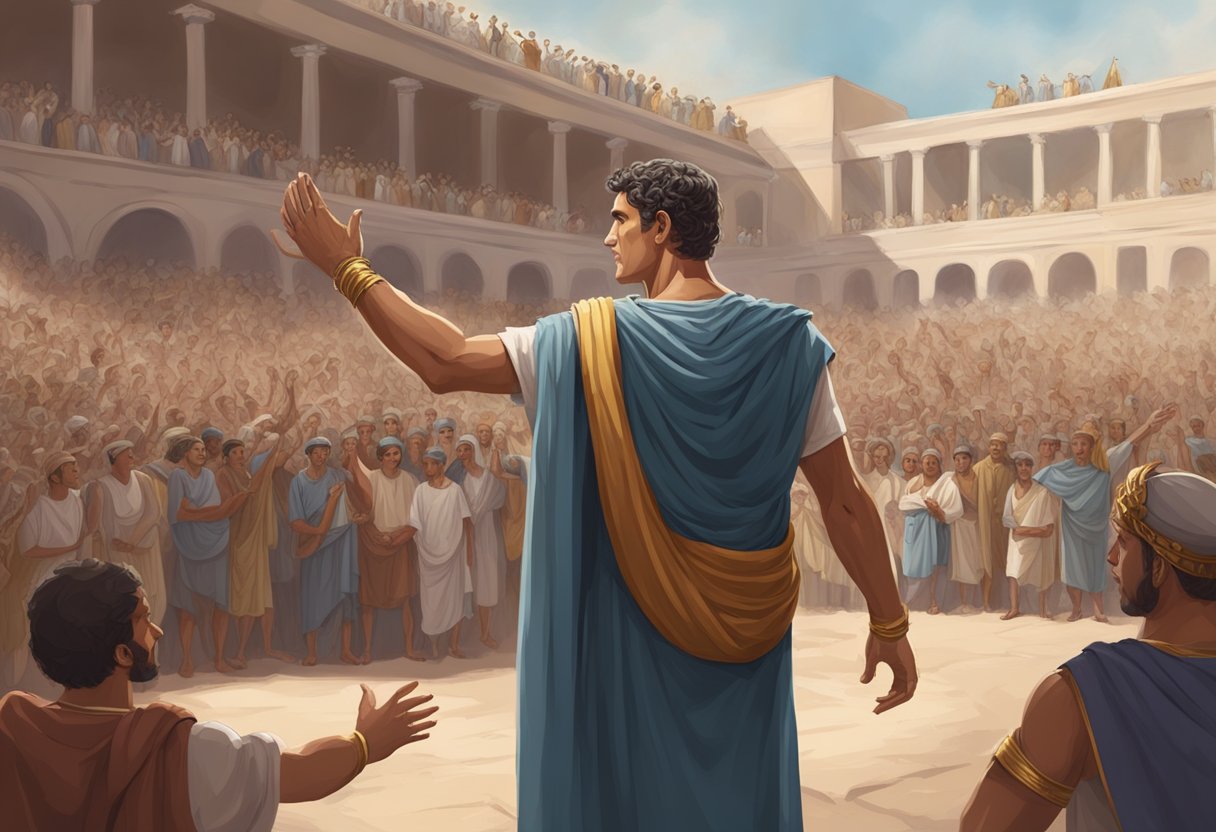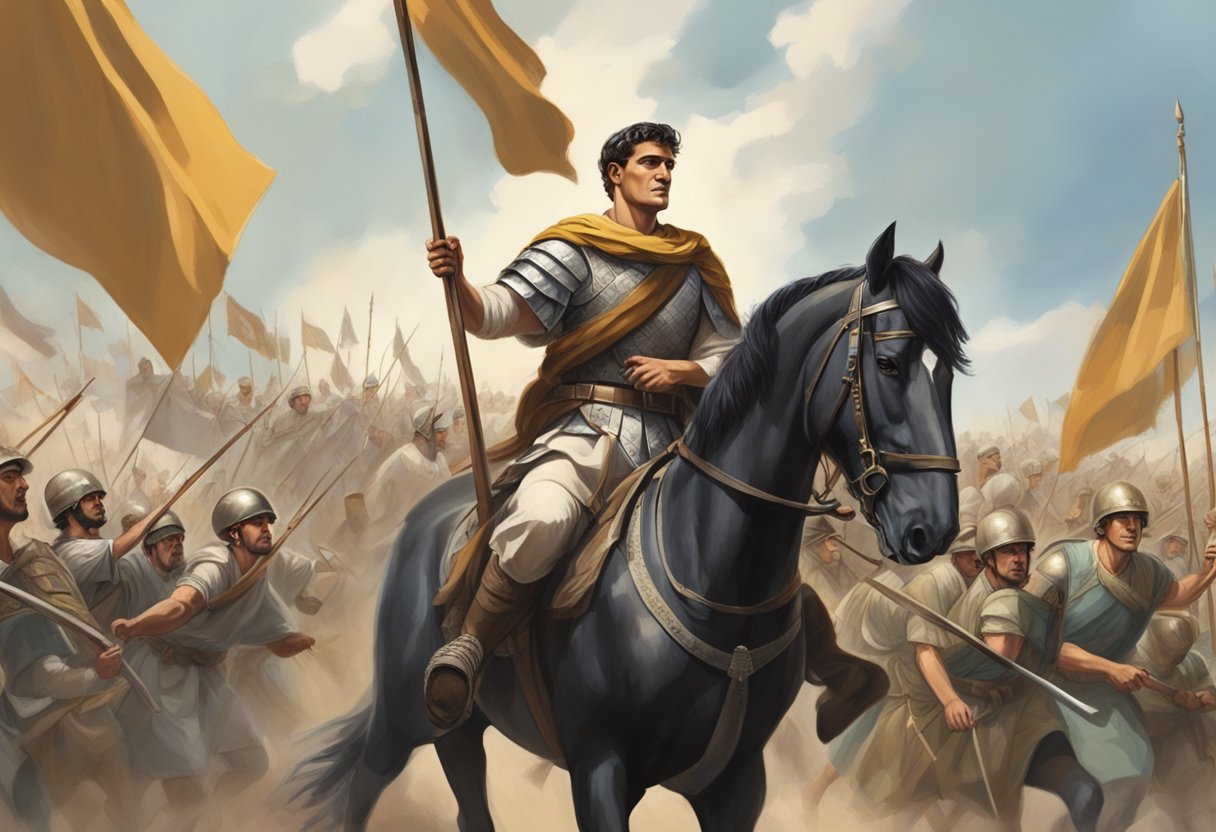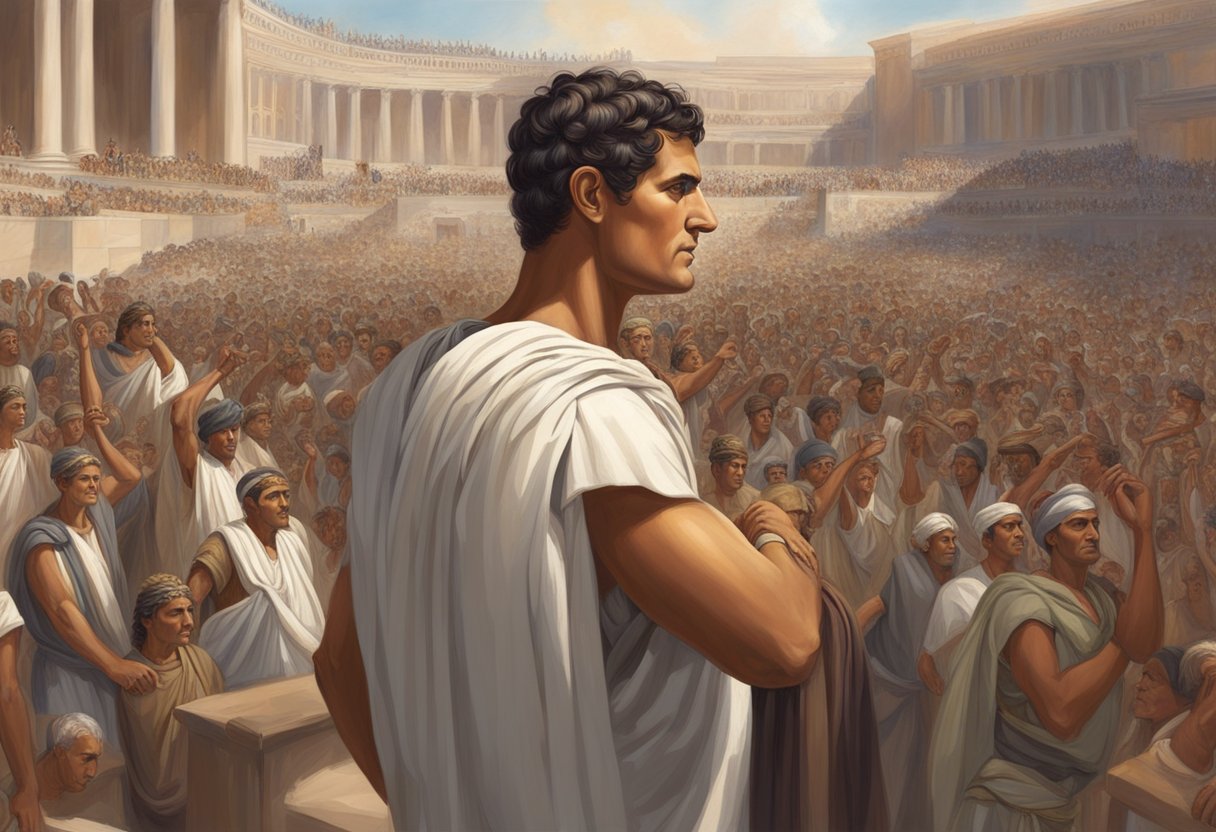Mark Antony, a figure etched in the annals of Roman history, stands as a testament to the complexities of political and military leadership during a transformative period. Born into a family of plebeian nobility, Antony’s early life set the stage for his ascension within Rome’s political hierarchy.
His career advanced significantly through military endeavors and alliances that secured his prominence in the Roman political landscape.

Antony’s historical significance stems largely from his close association with Julius Caesar, and his subsequent role in the formation of the Second Triumvirate alongside Octavian and Lepidus.
This period saw a tumultuous blend of political maneuvering and military campaigns aimed at consolidating power and exacting revenge on Caesar’s assassins. Antony’s romantic and political alliance with Cleopatra further complicated his position, leading to a fraught conflict with Octavian, the future Emperor Augustus, which would ultimately decide the fate of Roman leadership.
Key Takeaways
- Mark Antony’s noble lineage influenced his rise in Rome’s political and military arenas.
- His involvement with Julius Caesar and the Second Triumvirate were pivotal in Rome’s history.
- Antony’s alliance with Cleopatra and subsequent conflict with Octavian marked the end of his political career.
Early Life and Rise to Power

Mark Antony, born Marcus Antonius around 81 BC, emerged from the ranks of Roman society to become a formidable politician and military commander. His father, Marcus Antonius Creticus, had an ill-fated military career, which left young Antony to navigate his early years under the cloud of his family’s diminished status.
Antony’s education, a standard element for a youth of his standing, likely included oratory, philosophy, and martial training, forming him into a capable leader and speaker.
His early adulthood was marked by turmoil within the Roman Republic, which provided a backdrop for his ascendance to power.
In his twenties, Antony found mentorship and opportunity under Aulus Gabinius, an influential Roman politician, who appointed him as a cavalry officer.
This role took him to parts unknown, such as the exotic city of Tarsus, where his military prowess grew.
It was also around this time that Antony aligned with Gaius Cassius Longinus, a key figure in Roman politics. However, their relationship would later evolve into one of contention following the assassination of Julius Caesar.
Military Campaigns and Alliances:
- Aulus Gabinius: Appointed Antony as a cavalry officer.
- Gaius Cassius: Initial ally turned adversary post-Caesar’s demise.
His varied experiences and alliances positioned Antony as a rising star in Roman politics. The complexity of the Roman Republic’s leadership dynamics provided Antony with the chance to hone his political acumen and military competencies, setting the stage for his eventual rise to power.
Role in Julius Caesar’s Rule
Mark Antony, an astute political figure and military commander, played a pivotal role in Julius Caesar’s governance of the Roman Republic. His actions and decisions were highly influential during some of the most critical periods of Caesar’s rule.
Collaboration with Julius Caesar
Mark Antony and Julius Caesar formed a strong alliance, with Antony often acting as Caesar’s right-hand man.
Antony’s climb up the political ladder began when he was chosen as a quaestor, which allowed him to work closely with Caesar.
Their collaboration was marked by mutual loyalty; Caesar found Antony’s military prowess particularly useful both in Rome and during military campaigns.
Governor of Italy
In 47 BC, when Caesar left for the campaign in Africa, Antony was appointed as the Governor of Italy.
This role was more than ceremonial; he wielded considerable authority, managing the heartland of the Roman Republic in Caesar’s absence. His governance helped maintain stability and ensured continued support for Caesar’s military expeditions.
Campaign in Gaul
Before his role as Governor, Mark Antony had been instrumental on the battlefield, serving as a general under Julius Caesar during the ambitious campaign in Gaul.
His command of the cavalry was crucial in several engagements throughout the conflict.
Antony’s military leadership not only expanded Rome’s territories but also bolstered his own standing as a military leader and aided Caesar’s consolidation of power.
Formation of the Second Triumvirate
In the aftermath of Julius Caesar’s assassination, the power vacuum in Rome led to the formation of the Second Triumvirate. This political alliance had profound implications for Rome’s structure and civil wars.
Alliance with Octavian and Lepidus
The Second Triumvirate was a political alliance formed by Gaius Julius Caesar Octavianus (Octavian), Marcus Antonius (Mark Antony), and Marcus Aemilius Lepidus in 43 BC.
This triumvirate was different from the unofficial coalition between Caesar, Pompey, and Crassus, as it was officially recognized by the Senate. It was established primarily to stabilize Rome and to coordinate the rule of its three leaders.
- Octavian: Adopted son and heir of Julius Caesar
- Mark Antony: Skilled military leader and ally of Caesar
- Lepidus: Caesar’s Master of the Horse and a competent administrator
Legal Reforms
The Second Triumvirate held unprecedented power, which included the ability to pass laws without the Senate’s approval, showcasing a significant shift in Rome’s power dynamics.
The triumvirs were granted imperium maius, the supremacy over all of Rome’s proconsuls, which effectively put them in charge of the Roman state.
- Imperium Maius: A level of power greater than that of other officials
- Senate’s Role Diminished: The traditional Republican governance eroded
Proscriptions
The proscriptions were one of the most infamous actions of the triumvirs, where they ordered the property confiscation and killing of their political enemies.
This brutal tactic was ostensibly used to raise funds for the ongoing civil war, but also served to eliminate those who opposed the triumvirs’ consolidated power.
- Notable Victims: Cicero and other senators
- Outcome: Consolidation of the Triumvirate’s power base
Political and Military Campaigns

Mark Antony was a Roman politician and general who played a prominent role in transforming the Roman Republic into the autocratic Roman Empire.
His political and military endeavors, particularly in the Battle of Philippi, the Eastern Provinces and Parthia, and various naval and land campaigns, solidified his reputation as a key figure in Roman history.
Battle of Philippi
In 42 BCE, Mark Antony, alongside Octavian, faced the assassins of Julius Caesar in a pivotal confrontation in Greece known as the Battle of Philippi.
The battle consisted of two engagements, and it was in the second that Antony’s strategic prowess led to a decisive victory against the forces of Brutus and Cassius.
The triumph at Philippi not only avenged Caesar’s assassination but also cemented Antony’s status as a masterful general and paved the way for his rule over the Eastern provinces of Rome.
Eastern Provinces and Parthia
Antony’s governance of the Eastern provinces was marked by both ambitious administration and military campaigns.
One notable campaign was his attempt to subjugate Parthia, the powerful kingdom east of Rome.
However, his Parthian campaign is often noted for its challenges and setbacks, highlighting the complexity of Eastern politics and warfare.
Despite difficulties, Antony managed to maintain his influence in the vital regions of Syria and the Eastern Mediterranean.
Throughout his military career, Mark Antony demonstrated remarkable versatility, commanding both naval and land campaigns with notable skill.
Before his infamous naval encounter at Actium, Antony’s military exploits were diverse, ranging from subduing rebels in Greece to securing territories in Africa.
His adaptability in various theaters of war is a testament to his capability as a leader in both civil and military spheres, consolidating his legacy as a formidable architect of Roman warfare and politics.
Relationship with Cleopatra
Mark Antony’s entanglement with Cleopatra, aside from being a passionate affair, had significant political implications. Their relationship was not only pivotal for the shifting power dynamics in the Roman and Egyptian realms but also resulted in the birth of three children.
Alliance and Affair
The alliance between Mark Antony, one of Rome’s most influential leaders, and Cleopatra, the Egyptian Queen, was both political and romantic.
Antony was initially in Egypt to secure resources for his military campaigns. In Alexandria, he forged a powerful connection with Cleopatra. This affair evolved rapidly from political expediency to a deep personal relationship.
Their partnership was contentious in Rome, where it was perceived not just as a scandal but also as a threat to Roman authority and stability. It became emblematic of Antony’s deviance from Roman values and was leveraged by his enemies to question his allegiance.
Children of Mark Antony and Cleopatra
Cleopatra and Mark Antony had three children – twins Cleopatra Selene and Alexander Helios, and later, Ptolemy Philadelphus. Their children were seen as a symbol of the combined authority of Egypt and Rome.
- Cleopatra Selene II (Daughter)
- Alexander Helios (Son)
- Ptolemy Philadelphus (Son)
Despite the potential for these children to assert significant influence, their fates became bound to their parents’ political misfortunes. Their lineage was a blend of the Roman and Egyptian cultures, potentially signaling a new era of leadership had their parents prevailed.
Conflict with Octavian
The animosity between Mark Antony and Octavian eventually cleaved their political alliance. This plunge the Roman Republic into a series of conflicts that culminated in the decisive Battle of Actium. The strife was fueled by personal grievances, political rivalry, and competing ambitions.
Breakdown of the Triumvirate
The Second Triumvirate, composed of Mark Antony, Octavian, and Lepidus, began to deteriorate when tensions rose between Antony and Octavian. Antony’s marriage to Octavia, Octavian’s sister, temporarily allied the two powerful leaders.
However, Antony’s subsequent divorce from Octavia and his alliance with Cleopatra of Egypt severed his ties with Octavian, leading to open hostility. Octavian capitalized on Antony’s perceived betrayal, leveraging it to conspire against him politically.
Antony’s actions and alliances were portrayed as a threat to Roman values and stability, leading to the erosion of their triumvirate and setting the stage for inevitable conflict.
Battle of Actium
The Battle of Actium, a significant naval confrontation in 31 BCE, marked the zenith of the conflict between Mark Antony and Octavian. Antony’s fleet, bolstered by ships from Cleopatra’s Egypt, clashed with Octavian’s armada near the promontory of Actium in Greece.
Despite the numerical superiority of Mark Antony’s fleet, it was ultimately Octavian’s forces that emerged victorious. The defeat of Antony and Cleopatra’s combined forces not only signified the end of Antony’s bid for power but also paved the way for Octavian’s ascendancy.
Following Actium, Octavian consolidated control, marking the eventual transition from Republic to Empire and laying the foundation for his eventual rebranding as Augustus, the first Roman Emperor.
Final Years and Death
Mark Antony spent his final years embroiled in a battle for power that would ultimately lead to a tragic end.
The downward spiral of his fortunes was tightly interwoven with his alliance and romantic involvement with Cleopatra, the Queen of Egypt, which invariably influenced the course of his final actions and legacy.
Retreat to Alexandria
Following a series of political and military failures, including the decisive Battle of Actium in 31 BC, Mark Antony retreated to Alexandria, Egypt’s bustling cosmopolis and a haven for Cleopatra and him.
The defeat severely undermined his authority and position within the Roman world. This retreat to Egypt was not merely a military maneuver but also a symbolic unification with Cleopatra – a consolidation of the couple’s mutual defiance against Rome’s authority.
Death and Aftermath
August 1, 30 BC marks the end of Mark Antony’s life. Consumed by despair from the false news of Cleopatra’s suicide, he took his own life through suicide.
Unbeknownst to him, his beloved Cleopatra would soon follow suit, choosing death over submission to the victory parade of Octavian (later Emperor Augustus).
Their simultaneous demise has been frequently romanticized, but it also signifies a definitive close to a significant chapter in the history of Egypt and Rome. Their deaths handed Egypt over to Roman rule, ending its status as an independent power.
Cultural Impact and Legacy

The cultural impact and legacy of Mark Antony resonate through time, as his life and actions have been interpreted and reimagined in various mediums. His storied romance and political maneuvers provide a rich tapestry for artistic and historical exploration.
Representation in Literature and Art
Mark Antony’s character has been immortalized by some of the most influential writers and artists throughout history.
William Shakespeare cast him as a central figure in both Julius Caesar and Antony and Cleopatra, portraying him as a complex individual torn between duty and passion.
These dramatic interpretations have shaped Antony’s image in the collective consciousness as a romantic figure who prioritized love over the Roman state.
In art, Antony and Cleopatra’s love affair has been a timeless subject, explored by artists who often depict their dramatic demise as a symbol of tragic romance.
Historical Assessment of Mark Antony
The historical accounts of Mark Antony by Plutarch serve as a foundation for much of what modern scholarship understands about his life.
These biographies, while recognizing his military prowess and skill in rhetoric, also delve into the political implications of his actions within the Roman Empire.
Cicero was openly critical of Antony, often employing his own rhetorical skill to challenge Antony’s authority and decisions.
Antony’s role in the events leading up to and following the Ides of March, the assassination of Julius Caesar, was also heavily scrutinized.
The philosophical discourse of the era further examines the impact of his decisions, including the controversial alliance with Egypt, which ultimately contributed to the end of the Roman Republic and the birth of the Roman Empire.
Personal Traits and Public Perception

Mark Antony, a renowned figure in Roman history, was a complex character marked by various personal traits that influenced public perception.
As a politician and general, his assertive nature and strategic prowess garnered respect and fear in equal measure.
- Power and Leadership: Antony’s ascension to the role of Roman general and later, as a triumvir, was a testament to his effective leadership and command over power.
- Rhetoric Skills: Celebrated as a persuasive orator, his rhetoric influenced public opinion and manipulated the masses.
- Public Opinion: Despite his capabilities, Antony’s personal life often overshadowed his public duties, affecting his reputation as a tribune.
His personal behavior and its impact on public perception can be summarized in the following table:
| Trait | Influence on Public Perception |
|---|---|
| Political Acumen | Positive – Gained respect as a skilled politician |
| Military Leadership | Positive – Valued as an authoritative general |
| Oratory | Mixed – Admired for eloquence, yet seen as manipulative |
| Personal Life | Negative – Scandals smeared his public image |
Who was Mark Antony’s spouse?
Mark Antony was notably married several times. However, his most famous spouse was Cleopatra VII, the last active ruler of the Ptolemaic Kingdom of Egypt.
What led to Mark Antony’s death?
Mark Antony committed suicide in 30 BC. He did this following his defeat at the Battle of Actium and the belief that Cleopatra had died.
In what way was Mark Antony significant in history?
He was a pivotal figure in Roman history. He is recognized for transforming the Roman Republic into the autocratic Roman Empire through his alliance with Cleopatra and his conflict with Octavian.
How old was Mark Antony at the time of his demise?
Mark Antony was 53 years old when he died in 30 BC.
Did Mark Antony have a relationship with Julius Caesar?
Yes, Mark Antony was a trusted military commander and supporter of Julius Caesar. He later defended Caesar’s legacy as part of the Second Triumvirate.
What is the historical accuracy of Antony and Cleopatra’s relationship?
The relationship between Antony and Cleopatra is well-documented. It is often romanticized in literature and popular culture.
